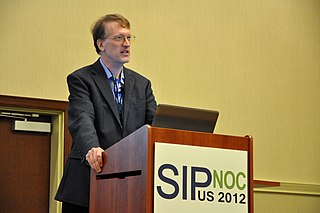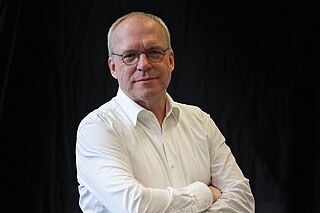The Fraunhofer Society is a German research organization with 76 institutes spread throughout Germany, each focusing on different fields of applied science. With some 29,000 employees, mainly scientists and engineers, and with an annual research budget of about €2.8 billion, it is the biggest organization for applied research and development services in Europe.

Manfred von Ardenne was a German researcher and applied physicist and inventor. He took out approximately 600 patents in fields including electron microscopy, medical technology, nuclear technology, plasma physics, and radio and television technology. From 1928 to 1945, he directed his private research laboratory Forschungslaboratorium für Elektronenphysik. For ten years after World War II, he worked in the Soviet Union on their atomic bomb project and was awarded a Stalin Prize. Upon his return to the then East Germany, he started another private laboratory, Forschungsinstitut Manfred von Ardenne.

The Digital Enterprise Research Institute (DERI) is a former research institute at NUI Galway. It is now part of the Insight Centre for Data Analytics. Insight was established in 2013 by Science Foundation Ireland with funding of €75m.

The Gottfried Wilhelm Leibniz Prize, or Leibniz Prize, is awarded by the German Research Foundation to "exceptional scientists and academics for their outstanding achievements in the field of research". Since 1986, up to ten prizes have been awarded annually to individuals or research groups working at a research institution in Germany or at a German research institution abroad. It is considered the most important research award in Germany.

The Berlin-Brandenburg capital region is one of the most prolific centers of higher education and research in the world. It is the largest concentration of universities and colleges in Germany. The city has four public research universities and 27 private, professional and technical colleges (Hochschulen), offering a wide range of disciplines. Access to the German university system is tuition free.
The Max Planck Institute of Colloids and Interfaces is located in Potsdam-Golm Science Park in Golm, Potsdam, Germany. It was founded in 1990 as a successor of the Institute for Physical Chemistry and for Organic Chemistry, both in Berlin-Adlershof, and for Polymer Chemistry in Teltow. In 1999, it transferred to newly constructed extension facilities in Golm. It is one of 80 institutes in the Max Planck Society (Max-Planck-Gesellschaft).
The Karl-Scheel-Preis is an award given annually by the Physikalische Gesellschaft zu Berlin, a regional association of the Deutsche Physikalische Gesellschaft, for outstanding scientific work. The prize was established through an endowment by the German physicist Karl Scheel and his wife Melida. Recipients are awarded with the Karl-Scheel Medal and 5.000 Euros. The Karl-Scheel Medal in bronze was designed by the German sculptor Richard Scheibe and has a diameter of 12 cm.

Henning Schulzrinne is a German-American computer scientist who led research and development of the voice over IP network protocols.

Hans-Jörg Bullinger is a German scientist and former president of the Fraunhofer-Gesellschaft.
webinos (Secure WebOS Application Environment) is a computing platform for the development of software components that are independent of the utilized computer hardware or operating system. At the same time, webinos is the name of the EU-funded project aiming to deliver this platform. The webinos platform is based on open-source software. Its objective is to enable web applications and services to be used and shared consistently and securely over a broad spectrum of converged and connected devices (cross-platform and cross-domain), including mobile, PC, home media (TV) and in-car units. More than 5,400 developers have already downloaded the webinos operating system.

José Luis Moreira da Encarnação is a Portuguese computer scientist, Professor Emeritus at the Department of Computer Science of the Technische Universität Darmstadt in Germany and a senior technology and innovation advisor to governments, multinational companies, research institutions and organizations, and foundations. He is involved in the development of research agendas and innovation strategies for socio-economic development with a focus on emerging economies. He is also a member of the Topical Network Information and Communication Technology (ICT) and ICT-related activities of the German National Academy of Science and Engineering (acatech) and the German Berlin-Brandenburg Academy of Sciences and Humanities (BBAW). He is an elected member of the ACM SIGGRAPH Academy (USA).

The Fraunhofer Institute for Telecommunications, Heinrich Hertz Institute, HHI, also known as Fraunhofer HHI or Fraunhofer Heinrich Hertz Institute, is an organization of the Fraunhofer Society based in Berlin. The institute engages in applied research and development in the fields of physics, electrical engineering and computer sciences.

The Leibniz Institute of Polymer Research Dresden in Dresden – in short IPF Dresden – is a non-university research institute and a member of the Leibniz Association. The IPF is carrying out fundamental as well as application-oriented research in all areas of polymer science and investigates polymer materials with new or improved characteristics. In the material development, emphasis is given to nanotechnological aspects as well as to biosystem interfaces.
The Center for Advancing Electronics Dresden (cfaed) of the Technische Universität Dresden is part of the Excellence Initiative of German universities. The cluster of excellence for microelectronics is funded from 2012 to 2017 by the German Research Community (DFG) and unites about 60 Investigators and their teams from 11 institutions to act jointly towards reaching the Cluster's ambitious aims. The coordinator is Prof. Dr.-Ing. Gerhard Fettweis, Chair of Mobile Communication Systems. The cluster brings together the teams from two universities and several research institutes in Saxony: Technische Universität Dresden, Technische Universität Chemnitz, Helmholtz-Zentrum Dresden-Rossendorf (HZDR), Leibniz Institute for Polymer Research Dresden e.V. (IPF), Leibniz Institute for Solid State and Materials Research Dresden (IFW), Max Planck Institute of Molecular Cell Biology and Genetics (MPI-CBG), Max Planck Institute for the Physics of Complex Systems (MPI-PKS), Nanoelectronics Materials Laboratory gGmbH (NaMLab), Fraunhofer Institute for Electronic Nano Systems, Fraunhofer Institute of Ceramic Technologies and Systems and Kurt Schwabe Institute for Measuring and Sensor Technology Meinsberg e.V. (KSI). About 300 scientists from more than 20 different countries are working in nine research paths to investigate completely new technologies for electronic information processing which overcome the limits of today's predominant CMOS technology.

The Fraunhofer Institute for Systems and Innovation Research is part of the Fraunhofer Society for the promotion of Applied Research e.V. (FhG), Europe’s largest application-oriented research organization. The institute is based in Karlsruhe. It conducts applied research and development on innovations in engineering, economics, the natural sciences and social sciences. The Fraunhofer ISI is one of the leading Institutes for innovation research in Europe.

Manfred Curbach is a German civil engineer and university professor. He is a leading researcher in the development of textile-reinforced concrete and carbon reinforced concrete respectively.

The Department of Computer Science is a department of the Technische Universität Darmstadt. With a total of 36 professorships and about 3,700 students in 12 study courses, the Department of Computer Science is the largest department of the university. The department shapes the two research profile areas "Cybersecurity (CYSEC)" and "Internet and Digitization (InDi)" of the university.

The Technical University Ingolstadt of Applied Sciences is a German public research-oriented university of applied sciences located in Ingolstadt. Founded in 1994, it currently has around 6,500 students in five faculties and offers more than 80 courses of study. The central focus of research and teaching are in technology and business. The main campus is located in the center of Ingolstadt. The second campus is located in Neuburg an der Donau.

Eric Bodden is a German computer scientist. He holds the Chair of Secure Software Engineering at the Heinz Nixdorf Institute of the Paderborn University and is Director of Software Engineering and IT Security at the Fraunhofer Institute for Mechatronic Design (IEM). He is also head of the engineering department in the Collaborative Research Centre 1119 CROSSING at the Technical University of Darmstadt.














